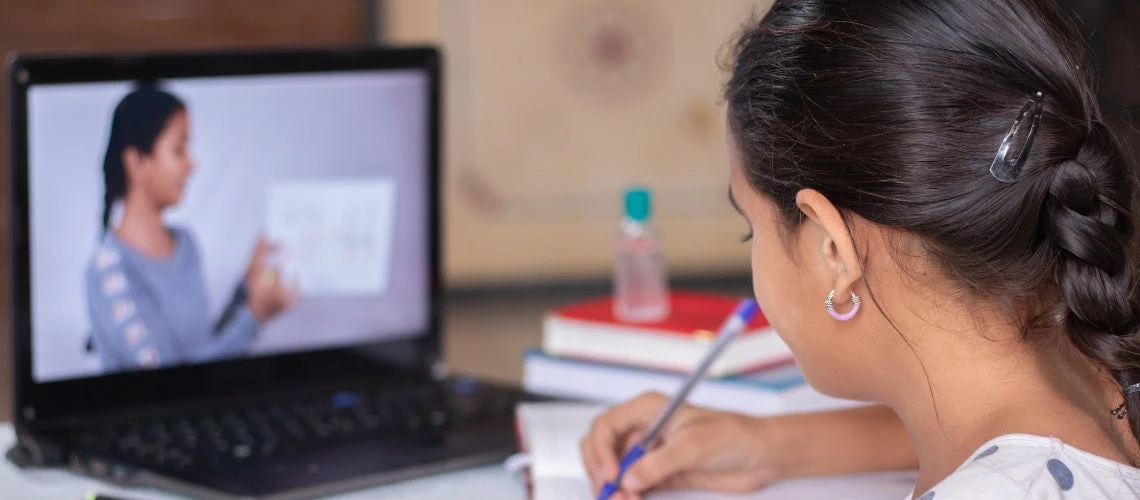 While most countries know the different technologies available for remote learning, many lack the "know how" to select, use, and contextualize them effectively. Copyright: Shutterstock
While most countries know the different technologies available for remote learning, many lack the "know how" to select, use, and contextualize them effectively. Copyright: Shutterstock
Technology can act as a catalyzer to improve and accelerate learning. After the COVID-19 pandemic, incorporating technology to make education systems more resilient to future crises has become crucial. In fact, one of the main takeaways post-pandemic is that technology is not an add on anymore but a clear need.
However, while most countries know the different technologies available for remote learning, many lack the "know how" to select, use, and contextualize them effectively. In addition, they may need more information to make decisions on optimal combinations and seamless integration of the technologies, plan for a holistic implementation, and procure them cost-effectively.
The use of EdTech should be guided by a clear purpose and focus on educational objectives; reach all learners; empower teachers; engage an ecosystem of partners; and rigorously and routinely use data to learn what strategies, policies and programs are effective to maximize student learning. With this in mind, designing an EdTech program can seem daunting and complex. How do you explore them and pick from the myriad of technologies available? What are the most relevant to your needs? It is difficult to answer these questions if you don’t have continuous advice of EdTech experts who can guide you through those key decisions.
This is why the World Bank has developed its series of EdTech knowledge packs (KPs). These topical, hands-on guides will give you a clear understanding of the different kinds of technologies available for education, their benefits, the context in which it is relevant to use them, the main stakeholders involved, the key barriers for adoption as well as insights for successful implementation. The KPs are based on the latest research and data, but they are intended to be interactive pragmatic tools that offer actionable recommendations. They provide thorough technical knowledge, but use simple structure and clear vocabulary to make them accessible to non-technical stakeholders. They give actionable guidance, but have a wide audience of both technical and non-technical stakeholders with different goals.
Currently, 16 KPs have been developed by the World Bank. The topics of these KPs cover the six main EdTech themes: learning continuity, teacher development, digital infrastructure, system-level support, skills development and learner-centered technology.
These resources are built upon a simple and effective structure to highlight the content in a way that best serves the reader and their most pressing questions. Their structure is composed of four main sections, namely the whos, the whys, the whats, and the hows, designed to provide key introductory knowledge on the basics of each topic. The KPs also contain a series of examples and best practices, annexes with frequently asked questions and additional resources so that readers can go in depth in any of the themes covered.
What are some key cross-cutting takeaways from the KPs?
Technology, when integrated correctly, can be part of the solution to complex education problems. But you must start with identifying the problem you want to solve, before considering using technology as a solution.
We recommend that you use the latest research to know more about the different technological tools at your disposal to boost your project. Make sure you have explored the different configurations enabled by the technology you plan to integrate, to adapt it the best possible way to your use case. For example, you might learn a lot from what has been done in other countries, in similar or different contexts, and get innovative ideas that will inspire you to design your own project.
Another important lesson to keep in mind is that during the planning phase, as soon as you start reflecting on the adequate deployment process, you should think about the way you will monitor the implementation, evaluate the success and measure the impact of your project.
How can the knowledge packs be used?
These global public goods can be used in many ways. For instance, a policymaker who wants to launch a program for teachers’ training supported by technological solutions will find guidance and resources in the Teachers’ Skills KP. Or a teacher willing to explore the technological possibilities to support their learners with disabilities can get inspired by the initiatives shared in the Assistive Technologies KP.
Exploring the existing literature on educational technology can be a non-stop 24/7 task. Not everyone has the time, the "bandwidth" or simply the interest to dive deeply into this field. These knowledge packs can be an excellent starting point. Explore and share these resources with your community. Having the right knowledge not only can save you time, but can also help you make the best possible decision.
You can already access and download the KPs here. To learn more, you can also hear from the team who conducted the elaboration of the KPs on this podcast.





Join the Conversation